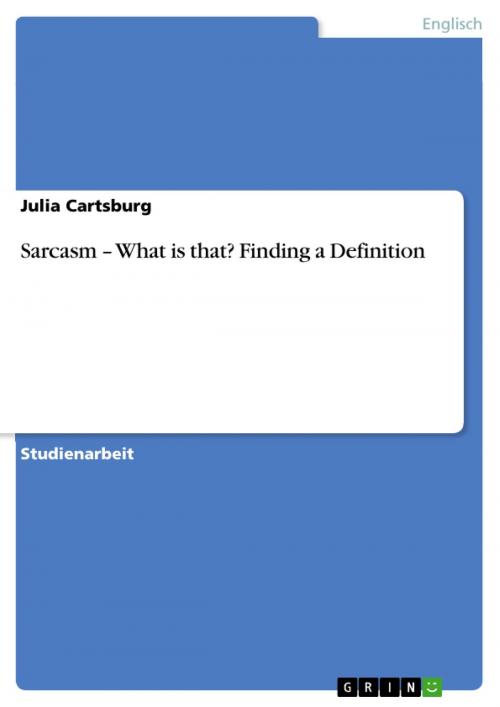Sarcasm - What is that? Finding a Definition
What is that? Finding a Definition
Nonfiction, Entertainment, Drama, Anthologies| Author: | Julia Cartsburg | ISBN: | 9783640501298 |
| Publisher: | GRIN Verlag | Publication: | December 30, 2009 |
| Imprint: | GRIN Verlag | Language: | German |
| Author: | Julia Cartsburg |
| ISBN: | 9783640501298 |
| Publisher: | GRIN Verlag |
| Publication: | December 30, 2009 |
| Imprint: | GRIN Verlag |
| Language: | German |
Studienarbeit aus dem Jahr 2007 im Fachbereich Anglistik - Linguistik, Note: 2, Martin-Luther-Universität Halle-Wittenberg, Sprache: Deutsch, Abstract: For many years, researchers have investigated the subject humour and tried to define what is behind it and which different kinds of humour do exist. An essential part of these investigations is concerned with irony, as one type of humour. In general, researchers agree that someone makes an ironic remark when the intended meaning of the speaker is different from what has actually been expressed. What the speaker really believes and thinks is said in an indirect way. Therefore, the listener is forced to recognize the discrepancy between the literal and the figurative meaning in order to understand what the speaker was trying to say. What irony makes a part of humour is the tension which is created by the juxtaposition of two opposite meanings. This incongruity of these two opposite meanings can lead to a comic effect.Another important form of humour is sarcasm. Unfortunately not much research has been done on that topic although sarcasm seems to be omnipresent in our daily lives. Most people use the terms sarcasm, sarcastic, or sarcastically in many situations. It is a term which is often used when someone makes a humorous remark. Even in literature the phrase '..., he said sarcastically' is very common. Therefore, one could assume that sarcasm is easy to recognize and to understand. Nevertheless, it is interesting to know that whenever people are asked to define sarcasm they are not able to give a clear definition or an explanation and they start stammering. Even linguistic researchers do not come to an agreement about the definition of sarcasm. Therefore, the aim of this paper is to clarify the term by taking different approaches and in the end to find a new, better comprehensible definition. At first, different entries in various dictionaries shall give a general overview of the meaning of the term. Secondly, with the help of scientific linguistic essays of Toplak/Katz, Rockwell, and Attardo/Eisterhold/Hay/Poggi a deeper insight into sarcasm shall be given. At the end of this analysis, with the help of some examples, it is tried to place sarcasm in the field of humour by explaining the superiority, surprise, and incongruity theory. Then, the focus is on the different ways of people's perception of sarcasm which is depending on their point of view. After this discussion, the role of irony when being sarcastic is argued which finally ends in a new definition of sarcasm.
Studienarbeit aus dem Jahr 2007 im Fachbereich Anglistik - Linguistik, Note: 2, Martin-Luther-Universität Halle-Wittenberg, Sprache: Deutsch, Abstract: For many years, researchers have investigated the subject humour and tried to define what is behind it and which different kinds of humour do exist. An essential part of these investigations is concerned with irony, as one type of humour. In general, researchers agree that someone makes an ironic remark when the intended meaning of the speaker is different from what has actually been expressed. What the speaker really believes and thinks is said in an indirect way. Therefore, the listener is forced to recognize the discrepancy between the literal and the figurative meaning in order to understand what the speaker was trying to say. What irony makes a part of humour is the tension which is created by the juxtaposition of two opposite meanings. This incongruity of these two opposite meanings can lead to a comic effect.Another important form of humour is sarcasm. Unfortunately not much research has been done on that topic although sarcasm seems to be omnipresent in our daily lives. Most people use the terms sarcasm, sarcastic, or sarcastically in many situations. It is a term which is often used when someone makes a humorous remark. Even in literature the phrase '..., he said sarcastically' is very common. Therefore, one could assume that sarcasm is easy to recognize and to understand. Nevertheless, it is interesting to know that whenever people are asked to define sarcasm they are not able to give a clear definition or an explanation and they start stammering. Even linguistic researchers do not come to an agreement about the definition of sarcasm. Therefore, the aim of this paper is to clarify the term by taking different approaches and in the end to find a new, better comprehensible definition. At first, different entries in various dictionaries shall give a general overview of the meaning of the term. Secondly, with the help of scientific linguistic essays of Toplak/Katz, Rockwell, and Attardo/Eisterhold/Hay/Poggi a deeper insight into sarcasm shall be given. At the end of this analysis, with the help of some examples, it is tried to place sarcasm in the field of humour by explaining the superiority, surprise, and incongruity theory. Then, the focus is on the different ways of people's perception of sarcasm which is depending on their point of view. After this discussion, the role of irony when being sarcastic is argued which finally ends in a new definition of sarcasm.















